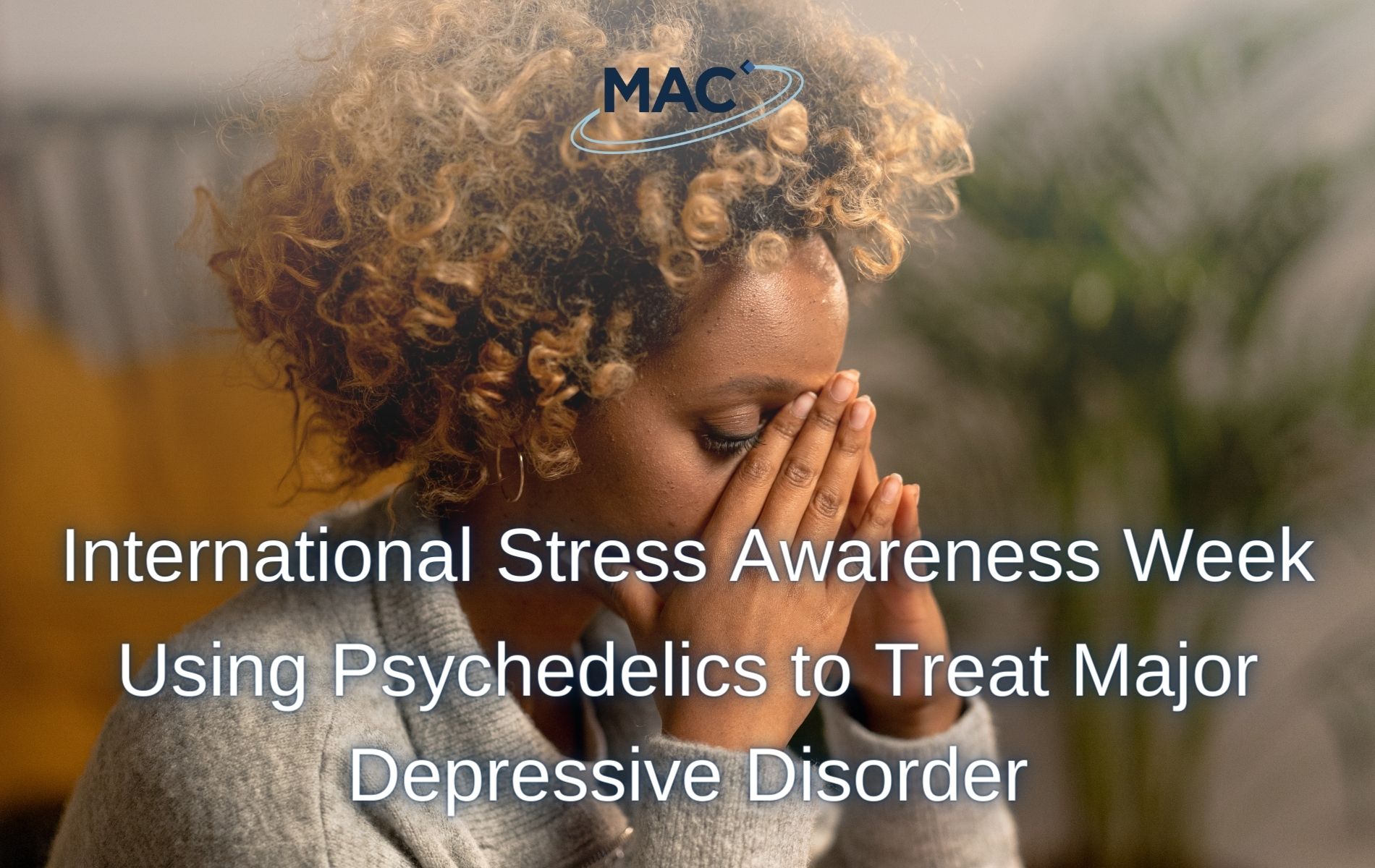As we observe International Stress Awareness Week, it’s essential to recognise the profound impact that stress can have on our mental and emotional well-being. 74% of people in the UK have been overwhelmed or unable to cope due to feeling stressed1. One of the most severe consequences of unmanaged stress is Major Depressive Disorder (MDD), a debilitating condition that affects millions worldwide2. In recent years, there has been a growing interest in alternative treatments, including the use of psychedelics, to address depression, shedding new light on the potential for innovative therapeutic approaches as up to 30% of people with depression don’t respond to treatment with antidepressants3.
The Stress-Depression Connection
Stress is an omnipresent aspect of our lives, and while moderate stress can be a natural response to life’s challenges, chronic stress can lead to a host of physical and mental health issues, with depression being a significant one. MDD, characterised by persistent sadness, loss of interest or pleasure, changes in appetite and sleep patterns, and feelings of hopelessness, can be a devastating outcome of chronic stress. Understanding the connection between stress and depression is crucial for developing effective treatments. The relationship between stress and depression is complex, with chronic or severe stress often increasing the risk of developing depression4. Prolonged exposure to stress can disrupt the brain’s chemical balance and contribute to the onset of depressive symptoms in susceptible individuals. Stress can also exacerbate symptoms of MDD by increasing the levels of stress hormones in the body, affecting neurotransmitter function, and altering brain structure and function5. This can intensify feelings of sadness, hopelessness, and fatigue, making depression more severe and harder to manage.
The Psychedelic Renaissance
In recent years, there has been a resurgence of interest in the use of psychedelics for mental health treatment. Substances like psilocybin (found in magic mushrooms), LSD, and MDMA are gaining attention for their potential to address various mental health conditions, including depression. Psychedelic-assisted therapy involves carefully controlled sessions where patients are guided by trained professionals to navigate the psychedelic experience and explore their thoughts and emotions in a profound way, in a safe environment.
Psychedelics and Depression: Emerging Insights
While research on the use of psychedelics to treat depression is still in its early stages, there have been promising developments. Studies have shown that psychedelics can have a profound impact on mood, perception, and consciousness. Patients who have undergone psychedelic-assisted therapy have reported significant reductions in depressive symptoms and improved overall well-being6.
One of the key features of psychedelic therapy is that it can help individuals confront the root causes of their stress and depression. Psychedelics can promote introspection, foster emotional release, and offer a unique perspective on one’s life and challenges. This introspective journey may help individuals break free from the cycle of stress and depression6.
Safety and Legal Considerations
It’s crucial to note that the use of psychedelics for depression treatment should only be undertaken in a controlled and supervised medical or therapeutic setting. Dr Shoona Vincent, Vice President of Clinical Science at MAC Clinical Research said “It’s important to note that the medicinal use of psychedelic drugs can only be administered in measured doses under the supervision of licensed medical professionals. Using the same drugs recreationally or without a prescription to manage mental health issues is not only illegal in the UK, but it’s also dangerous, as it can lead to the opposite effect; worsening symptoms instead of relieving them”. The research and application of psychedelics for mental health are highly regulated and require professional guidance.
International Stress Awareness Week serves as a reminder of the importance of acknowledging and addressing stress as a significant factor in mental health. Stress-related Major Depressive Disorder can be a severe and common condition, but the emerging field of psychedelic therapy offers a promising avenue for treatment. As research in this area continues to evolve, it is vital to remain informed about the potential benefits and risks associated with these therapies. With responsible research and application, we may find that psychedelics play a role in transforming the way we approach and treat depression, ultimately providing hope and relief for those who need it most.
To find out more about out our Depression With Cognitive Impairment clinical trial at MAC Clinical Research, visit our Depression With Cognitive Impairment page.
To be notified of future Major Depressive Disorder clinical trials at MAC Clinical Research, register your interest and submit your details to join our volunteer database.
All our clinical trials are free to take part in, and you’ll receive a full health check-up from one of our trained medical professionals as part of the trial. If eligible to take part, you’ll receive travel expenses to and from our clinics. You may also receive financial reimbursement for your time and commitment to the trial.
1 Mental Health Foundation – Stressed Nation: 74% of UK ‘overwhelmed or unable to cope’ at some point in the past year
2 World Health Organization – Depressive disorder (depression) (who.int)
3Psychiatrist – Identifying Difficult-to-Treat Depression: Differential Diagnosis, Subtypes, and Comorbidities | Psychiatrist.com
4 MQ Mental Health Research – Coping: Stress and Mental Health | MQ Mental Health Research
5 National Library of Medicine – The impact of stress on body function: A review – PMC (nih.gov)
6 NIH.Gov – How psychedelic drugs may help with depression | National Institutes of Health (NIH)




